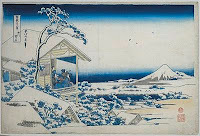08Viewing Hokusai--The Cushion Pine at Aoyama
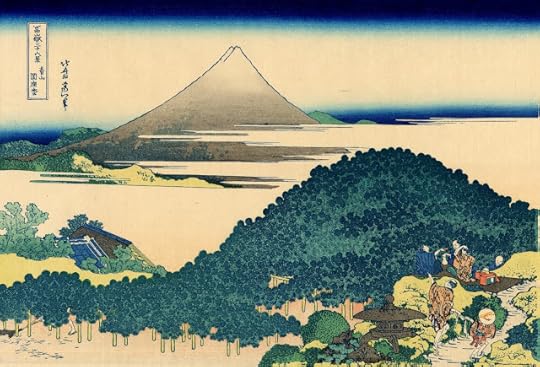 Hokusai, 青山円座松,
Hokusai, 青山円座松,The Cushion Pine at Aoyama
It’s not a hill,
This soft blue
Cushion, extending
Like grass down
The slope, it's a forest
With one root.
No haiku here--we get the whole hill,
And down here in a corner, out on the ledge,
Humans intrude, no, celebrate the view--
One traveler points out Fuji to his friend
While the others sit, next to wood chests,
Sharing a single red lacquer bowl.
--Jonathan Reeve Price
Another Interpretation of The Cushion Pine at AoyamaHere's another take on the same image, starting from Hokusai's original, mixing text and images in 24"x24" aluminum panels, catalogued in my book, Viewing Hokusai Viewing Mount Fuji.
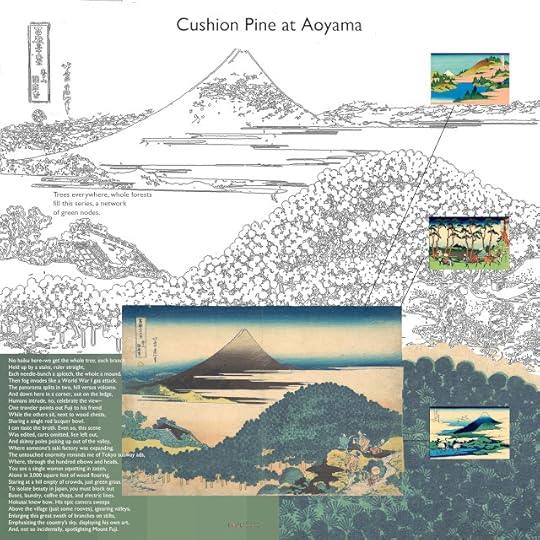
Other images in this series:
In this project, we take off from each picture in Hokusai's 36 Views of Mount Fuji, plus the extras he added when customers asked for more. We look at each original, then offer a visual and textual exploration of questions such as:
What was Hokusai getting at? How was he working? How did this practice align with his spiritual growth?Please skim down this set of thumbnails to spot a picture you might want to explore, then click through. Or get the complete set in the book, Viewing Hokusai Viewing Mount Fuji.
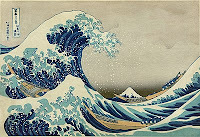
1 View through Waves off the Coast of Kanagawa
2 Morning after Snow in Koishikawa
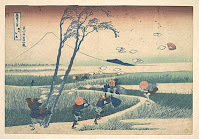
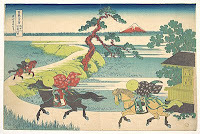
4 Sekiya Village on the Sumida River
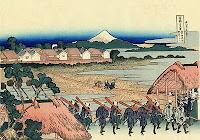
5 View from Senju in Musashi Province
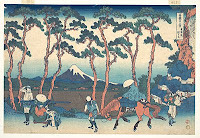
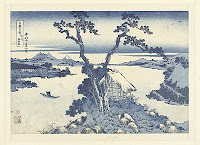 7 Lake Suwa in Shinano
7 Lake Suwa in Shinano
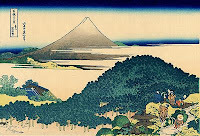 8 Cushion Pine at Aoyama
8 Cushion Pine at Aoyama
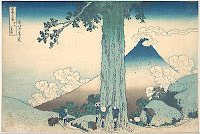 9 At Mishima Pass in Kai
9 At Mishima Pass in Kai
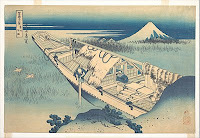 10 Ushibori in Hitachi
10 Ushibori in Hitachi
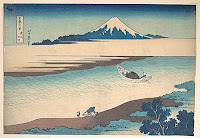 11 Tama River in Musashi
11 Tama River in Musashi
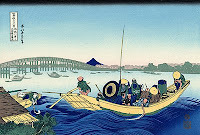 12 Sunset across the Ryōgoku Bridge from Sumida
12 Sunset across the Ryōgoku Bridge from Sumida
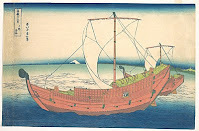 13 Sea Lane off Kazusa
13 Sea Lane off Kazusa
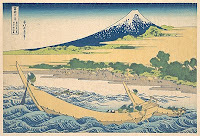 14 Off Tago Beach in Ejiri on the Tokaido
14 Off Tago Beach in Ejiri on the Tokaido
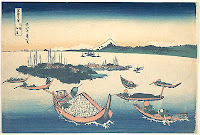 15 Tsukada-jima in Musashi Province
15 Tsukada-jima in Musashi Province
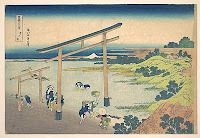 16 Bay of Noboto
16 Bay of Noboto
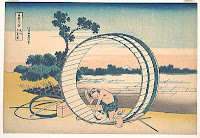 17 Fujimigahara in Owari
17 Fujimigahara in Owari
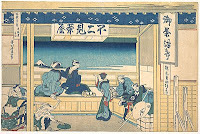 18 Yoshida on the Tōkaidō Highway
18 Yoshida on the Tōkaidō Highway
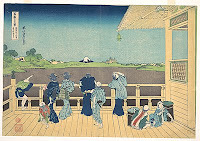 19 Sazai Hall, Temple of the 500 Arhats
19 Sazai Hall, Temple of the 500 Arhats
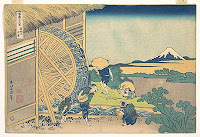 20 Watermill at Onden
20 Watermill at Onden
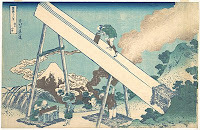 21 In the Mountains of Tōtōmi
21 In the Mountains of Tōtōmi
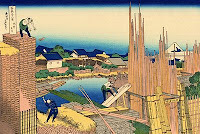 22 Tatekawa in Honjo
22 Tatekawa in Honjo
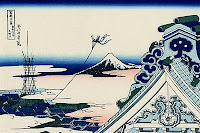 23 Hongan-ji Temple at Asakusa
23 Hongan-ji Temple at Asakusa
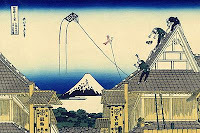 24 Mitsui Shop at Suruga-chō in Edo
24 Mitsui Shop at Suruga-chō in Edo
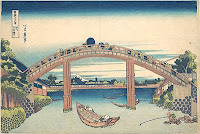 25 Under the Mannen Bridge in Fukagawa
25 Under the Mannen Bridge in Fukagawa
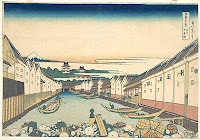 26 Nihonbashi
26 Nihonbashi
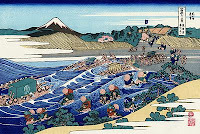 27 Crossing the Ōi River at Kanaya
27 Crossing the Ōi River at Kanaya
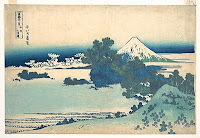 28 Shichiri Beach in Sagami
28 Shichiri Beach in Sagami
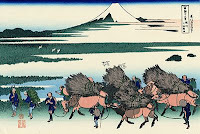 29 New Fields at Ōno Shinden
29 New Fields at Ōno Shinden
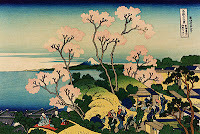 30 Hills at Gotenyama above Shinagawa
30 Hills at Gotenyama above Shinagawa
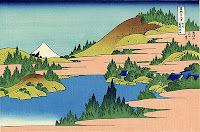 31 The Lake at Hakone in Sagami
31 The Lake at Hakone in Sagami
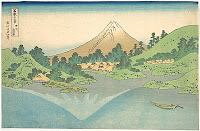 32 Misaka in Kai
32 Misaka in Kai
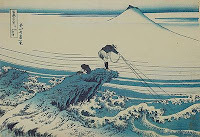 33 Kajikazawa in Kai Province
33 Kajikazawa in Kai Province
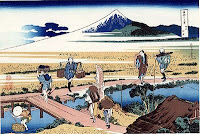 34 Nakahara in Sagami
34 Nakahara in Sagami
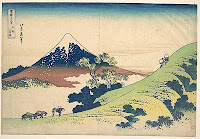 35 The Inume Pass in Kai Province
35 The Inume Pass in Kai Province
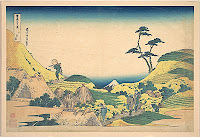 36 Shimo Meguro
36 Shimo Meguro
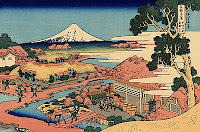
37 Tea Fields at Katakura in Suruga
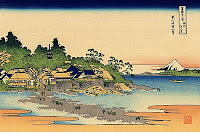 38 Sōshū Enoshima in Sagami
38 Sōshū Enoshima in Sagami
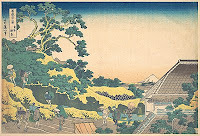 39 Surugadai in Edo
39 Surugadai in Edo
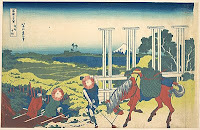 40 Senju in Musashi Province
40 Senju in Musashi Province
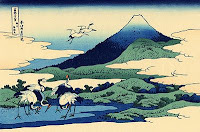 41 The Fields of Umezawa in Sagami
41 The Fields of Umezawa in Sagami
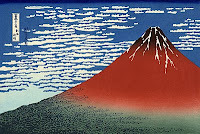 42 A Fine, Breezy Day
42 A Fine, Breezy Day
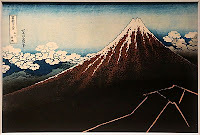 43 Storm Below the Summit
43 Storm Below the Summit
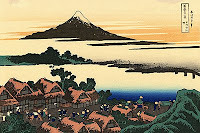 44 Dawn at Isawa in Kai Province
44 Dawn at Isawa in Kai Province
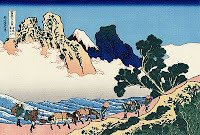 45 The Other Side of Mt. Fuji, from Minobu River
45 The Other Side of Mt. Fuji, from Minobu River
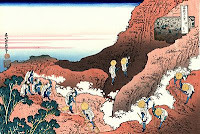 46 Climbing Mt. Fuji
46 Climbing Mt. Fuji
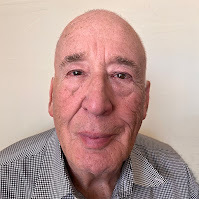
47:Viewing Hokusai--Afterword About Hokusai, Me, and MonetAbout the BookViewing Hokusai Viewing Mount FujiISBN-10: 0-9719954-7-8 ISBN-13: 978-0-9719954-7-576 pages, full colorThis book is a meditation on Hokusai, taking apart the prints in the series, 36 Views of Mount Fuji, zooming in digitally, assembling a 21st century interpretation of his practice, as he celebrates the natural landscape of a nation coming up with a new idea of itself.
Each image starts with one of Hokusai’s views, disassembles it, constructs a new picture out of the pieces, as a visual critique, and adds floating text chunks—brief observations, snippets of poetry, stray thoughts.
Thumbnails of the originals let you compare the before-and-after, gauging Hokusai’s wood-block print against the pixelated, sliced, and diced collage, and the scattered writings that reflect on his drive for immortality, his exploitation of newly available pigments, his fondness for the interplay of text and image, and his love for the ordinary workers and travelers out in the country.
An Afterword discusses the path that the artist and poet, Jonathan Reeve Price, took to this homage to Hokusai. He sees parallels between Hokusai’s art practice and the functions available in software such as Photoshop, tactics that he has adapted to our century—zooming, revising, layering, making depth hard to read, indulging in bright blocks of color. Hokusai created more than a thousand images combining poetry and imagery, and Price points to those artworks as justification for his own mixing of language, line, and color in his responses.
In 19th century Japan, the number 36 might have reminded literate customers of the number of the immortals—the classical poets of Japan and China. But when Hokusai’s series of 36 prints sold well, he added another 10 pictures. So this book offers a total of 46 digital images, followed by a critical essay, and an FAQ about the author’s background. Holding this book in your hand may not make you live forever, but, who knows, it might bring you some of Hokusai’s spirit.
Viewing Hokusai Viewing Mount Fuji
About Me
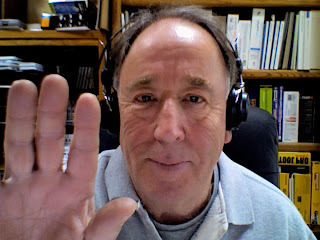 I'm Jonathan Reeve Price, an information architect, writer, and artist.
I'm Jonathan Reeve Price, an information architect, writer, and artist. Linked In: http://www.linkedin.com/in/JonathanReevePrice
Amazon Author Page: https://www.amazon.com/author/jonathanprice
Twitter: http://twitter.com/JonathanRPrice
Museum Zero: museumzero.art

